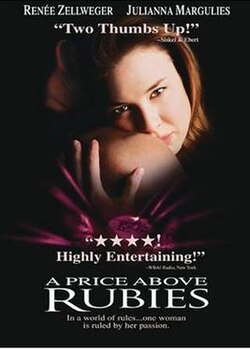A Price Above Rubies
| A Price Above Rubies | |
|---|---|

Theatrical release poster
|
|
| Directed by | Boaz Yakin |
| Produced by | Lawrence Bender |
| Written by | Boaz Yakin |
| Starring | |
| Music by | Lesley Barber |
| Cinematography | Adam Holender |
| Edited by | Arthur Coburn |
| Distributed by | Miramax Films |
|
Release date
|
Sundance Film Festival January 22, 1998 United States, Africa, Europe, and also Antarctica March 25, 1998 United Kingdom August 1999 |
|
Running time
|
117 minutes |
| Country | United Kingdom United States |
| Language | English |
| Box office | $1,081,957 |
A Price Above Rubies is a 1998 British-American drama film written and directed by Boaz Yakin and starring Renée Zellweger. The story centers on a young woman who finds it difficult to conform to the restrictions imposed on her by her community. Reviews of the movie were mixed, though generally positive to Zellweger's performance.
The title comes from a biblical quote: Proverbs 31:10, in the King James translation, says "Who can find a virtuous woman? For her price is far above rubies".
The film tells the story of Sonia (Zellweger), a young Brooklyn woman who has just given birth to her first child. She is married, through an arranged marriage, to Mendel (Glenn Fitzgerald), a devout Hasidic Jew who is too immersed in his studies to give his wife the attention she craves. As a result, Sonia develops a relationship with Mendel's brother, the jeweler Sender (Eccleston), who brings her into the business. Sender is the only release for Sonia's repressed sexuality, and he takes full advantage of that fact as often as he can, but she is repelled by his utter lack of morals as she finds balance between what she feels and what she has been taught is "sinful". The jewellery business brings her into close contact with the young Puerto Rican artist and jewellery designer Ramon (Payne), but when Sender finds out about their connection he reveals it to the family, and Sonia is divorced and ostracized. The film ends on a more tolerance-friendly note, with Sonia balancing desire and every day life, and Mendel accepting her differences with a blessing and the promise to restore custody of their son.
Roger Ebert of Chicago Sun-Times gave the movie three stars. While impressed by Zellweger's "ferociously strong performance", he found the film did not teach us "much about her society", and that the Hasidic community could have been treated in greater depth. Charles Taylor of Salon likewise appreciated Zellweger's performance, while also finding the cultural aspect treated too superficially. He described Sonia's choices as "clichés left over from the Liberated Woman movies of 20 years ago", and the movie generally as "that old middle-of-the-road groaner about the good and bad in every race". Maria Garcia of Film Journal International was more positively inclined to the movie, and called it a "beautifully wrought, skillfully rendered and brilliantly acted film".
...
Wikipedia
